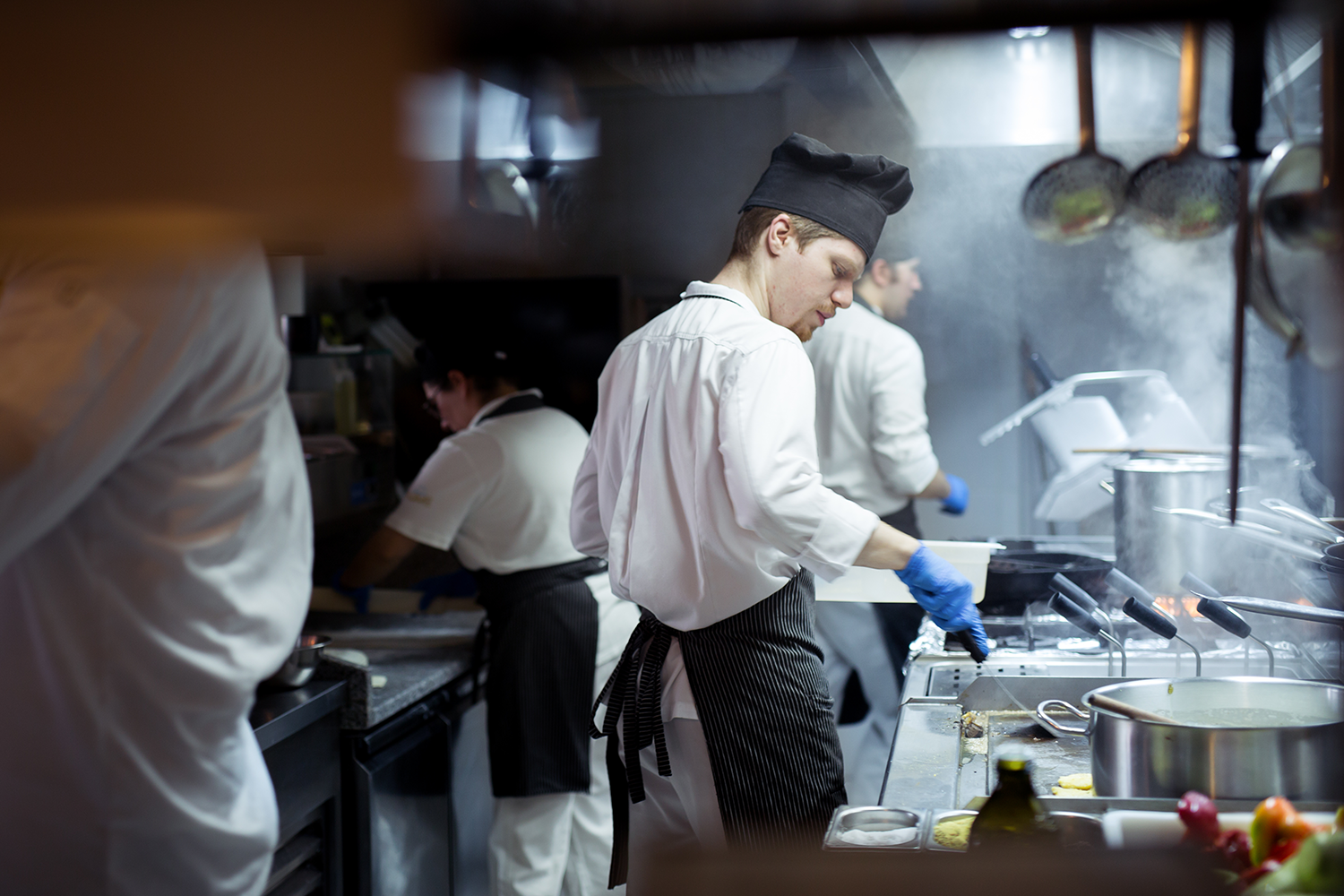They’re loud, they’re exhausted, they’re frequently angry, and there’s a decent chance you probably wouldn’t invite them over to your house. But when things start going down, the cooks on your line are the greatest human beings on the face of the earth.
You ask the impossible of your kitchen every day, and they pull it off without a complaint. OK, maybe there’s some complaints, but you try on-the-fly’ing a well-done tomahawk for a five minute pick-up when your grill only has enough space for a pair of 16-20 shrimp, the micros slips are an inch away from hitting the floor, you’re on your third straight double, and you haven’t smoked in three hours.
(How did I survive this lifestyle for 15 years???)
The point is, your cooks are stressed, and in all likelihood, you’re causing quite a bit of that strain. It’s not your fault, though. Your job is to maximize check sizes and turn tables as quickly as possible. One of the best ways to do that is asking those superhuman feats from people armed only with tongs, spatulas, and very, very sharp knives. There are, however, several ways you can keep those knife-wielders happy and your restaurant humming.
No “Flat Sat” Nonsense
A good host is worth their weight in gold. Controlling the flow of guests and where they are in their respective stages of the meal helps the restaurant maintain a consistent pace.
On the other hand, seating the entire floor at once creates impossible bottlenecks that creates an arms race between your cooks and your diners to see who will explode first. Train your host staff to read the floor and the waitlist to know when to push and when to hold back.
Don’t Skimp on Kitchen Labor
If back of the house labor isn’t your single biggest expense, it’s definitely near the top. It’s also easily controllable, which makes it an attractive target when your bottom line isn’t as fat as you’d like it. You may think that four cooks can do the work of five; you’re probably wrong. Understaffing will have your crew taking on responsibilities beyond their purview. Sure, your grill cook can probably make salads, but not as well as your garde manger can, and it also drags down the quality of your grilled items. The slight drop in labor cost is never worth the sharp decrease in quality.
Don’t Skip the Stage
As a tie-in to the labor concerns, make sure you’re hiring the right people. Staffing a line can feel like a crapshoot at times. Resumes don’t always tell the whole story when it comes to a cook; a guy can work at the same place for 15 years and never rise above mediocrity, while an absolute rock-star might have their fair share of short stints.
Staging can serve as tryout of sorts, helping you get a sense of a cook’s potential and seeing how they fit in with the rest of your line. Their egos and demeanors are just as important as their knife skills and speed. You need to make sure it’s a comfortable mesh: the sum of the parts is greater than the whole.
ABC: Always Be Communicating
You need to have open and honest discussions with the kitchen throughout your service. If you’ve oversaturated the restaurant or overpromised to your guests, your line will have your back and come through -- provided you talk to them. Don’t be afraid to tell them you’ve loaded an extra burden on their shoulders; they can handle it.
At the same time, nobody’s asking you for a 20-page dissertation of Don Quixote, but if you don’t have at least an elementary grasp of Spanish (or Portuguese), odds are there may be more than a few misunderstandings. Take the time to learn the basics: food, kitchen equipment, common verbs. It will help you keep things running smoothly. This simple gesture enhances not only your shop’s efficiency, but also camaraderie and helps your cooks feel valued.
Remember, Your Kitchen Staff are People First
The time may come when you want to run into the kitchen and scream your lungs out. Orders coming out incomplete; long ticket times; items made incorrectly. You’ve got servers and guests breathing down your back as you watch comps go up and review stars go down.
You know what’s not going to help? Treating a bunch of adults (who are just as in the weeds as you are) like middle schoolers in detention. Instead of talking at your crew, listen to them and observe. Rather than standing there with an exasperated look on your face, jump in. Garnish a dish, clear a bus-bucket, grab them a back-up from the walk-in.
Appreciate the Effort
Positive reinforcement is perhaps the easiest and biggest difference maker you can employ. When your restaurant crushes a Saturday night dinner rush, your servers and bartenders can sometimes leave with their rent paid in one shift. Your cooks are clocking out with the exact same take-home pay as they would on a dead Tuesday lunch.
A round of drinks for the line doesn’t make up that financial gap, but it’s an easy way to say thank you. Another way is to literally say the words. Go in the kitchen and tell everyone behind that line how much you rely on their efforts and what a great night it was. You don’t have to exaggerate or blow smoke; an honest thank you keeps your team together and lets them see you as a leader instead of just a boss.












![Use the Touch Test for Cooked Meats [Hack #104]](https://images.squarespace-cdn.com/content/v1/56a2785c69a91af45e06a188/1507649910960-30Y6GR7NNEDEK201N34N/Cooking-Meat-Touch-Test.png)



![Appreciating the Diversity in our Restaurant's Kitchens [WATCH]](https://images.squarespace-cdn.com/content/v1/56a2785c69a91af45e06a188/1479310221655-ULIA52UC1ZKNPVXUD1GB/Hundred-Foot+Journey+diversity.png)